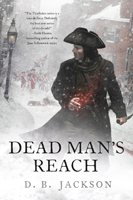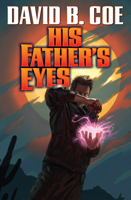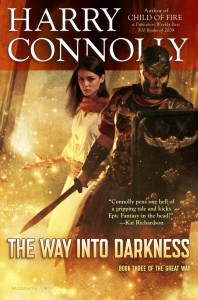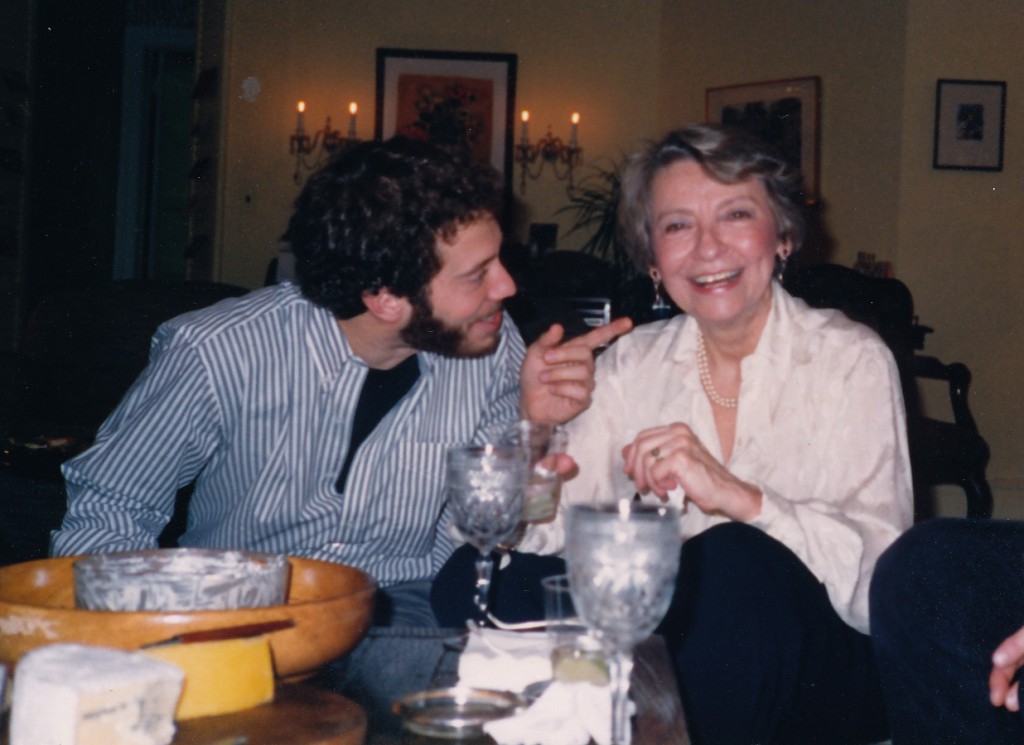Today on the 2015 Summer-of-Two-Releases Virtual Tour, I am posting over at Black Gate Magazine. This is a different sort of post for me. I have, thus far, avoided any comment on the Sad/Rabid Puppies-Hugo controversy, believing that I would be best off staying out of it. I write for both Tor Books and Baen Books, two publishers at the center of the matter, and I didn’t want to draw fire from either side. In this post, though, I break my silence. It’s time we recognized that we have far more in common with one another than not. It’s time for an end to this mess. Read the post here.
Tag Archives: writing
A New Short Story, and a Blog Post on Friendship
Big day today. And because I’m at the AMAZING Antioch Writers’ Workshop, and our days are pretty full, I’m only now getting around to posting about it. My newest short story, written as David B. Coe in the Justis Fearsson universe, is out at the Baen.com web site. The story is called “New Moon Wolf,” and in terms of chronology it falls in between Spell Blind, the first book in the Case Files of Justis Fearsson (which came out in January) and the second book, His Father’s Eyes, which comes out on August 4. I love this story, and I hope you enjoy it, too.
And the 2015 Summer-of-Two-Releases Virtual Tour rolls on with a special appearance at the blog of my wonderful friend Alethea Kontis. My post, appropriately enough, is about friendship, the world of writing, and the unexpected benefits of the best perk offered by this crazy profession. Find it here.
Today on the Virtual Tour
Today’s installment on the 2015 Summer-of-Two-Releases Virtual Tour finds me at the Fantasy Book Critic blog site. My post compares and contrasts the approach I took in the two novels I have coming out over the next few weeks — Dead Man’s Reach (as D.B. Jackson) and His Father’s Eyes (as David B. Coe). It’s a post about character, point of view, and narrative — you know, writer stuff. You can find it here. I hope you enjoy it.
The Virtual Tour Begins!!
Today, I begin my 2015 Summer-of-Two-Releases Virtual Tour, with a post at the Magical Words blog site. Dead Man’s Reach, the fourth and final volume of the Thieftaker Chronicles, will be released in nineteen days, on July 21. His Father’s Eyes, the second book in The Case Files of Justice Fearsson, drops two weeks after that, on August 4. This first post is about how different books fit into a series (or two . . .) in different ways. You can find the post here. I hope you enjoy it.
The Blog Tour!

 Yes, it’s that time of year again, when I start showing up at other people’s websites, talking about myself and my work. Also known as the blog tour! This year’s 2015 Summer of Two Releases Tour will begin later this week with a post at Magical Words, which is, in many ways, my “home” site. Over the next two months I’ll be visiting lots of sites — probably twenty or more, before all is said and done — and putting up more than thirty posts. The full schedule can be found here, and will be updated as needed. Hope to “see” lots of you along the way.
Yes, it’s that time of year again, when I start showing up at other people’s websites, talking about myself and my work. Also known as the blog tour! This year’s 2015 Summer of Two Releases Tour will begin later this week with a post at Magical Words, which is, in many ways, my “home” site. Over the next two months I’ll be visiting lots of sites — probably twenty or more, before all is said and done — and putting up more than thirty posts. The full schedule can be found here, and will be updated as needed. Hope to “see” lots of you along the way.
Today I am Interviewed by Diana Pharaoh Francis
I have a new interview up — my good friend Diana Pharaoh Francis, a wonderful writer in her own right, asked me some questions about writing Spell Blind, the first book in my new series, the Case Files of Justis Fearsson.
A Better Day
First off, my deepest thanks to all who left comments of support and encouragement and advice in response to yesterday’s post. Your words helped. Your good wishes helped. I knew already that I was not alone in feeling those things; the universality of those struggles I cataloged was one of the reasons I wrote the post in the first place. But hearing from so many of you that you understood from personal experience what I was going through, made it just a little easier. So again, thank you all.
And I’m happy to say that today was easier. There was no bursting of the dam, no comprehensive epiphany, but I didn’t expect either. Figuring out this new project is going to take some time. Today I made progress on my worldbuilding and some character work. I have something I can point at and say, “I did that today. I’m closer to where I want to be.” And tomorrow, I’ll get closer still.
Feeling better.
Don’t, Don’t, Don’t
I’ve debated back and forth about writing this post. Even now, as I type it out, I’m not sure I’ll ever actually put it up. Honesty wars with pride. Fear of revealing weakness and saying “the wrong thing” strives against the notion that reading this post might help others struggling with similar demons.
This has been another of those days — I seem to be having quite a few of them right now. By “those days,” I mean the ones that are filled with doubts and frustrations, stretches of idle time during which I do nothing but stare at a blank screen, getting nothing done and feeling like a lump.
But worse, I find myself falling into all sorts of old, bad habits, things that I have posted about, glibly telling aspiring writers “don’t do this and don’t do that.” And now here I sit, guilty of all the sins at which I’ve railed.
“Success,” I have said in recent posts, “must by self-defined. Don’t look to others for affirmation, find it within yourself.” But I feel myself surrounded my mirrors, as if I have stepped into an erroneously named funhouse. These mirrors are distorted, farcical. And yet I look at myself as I appear in them, and I wonder, “Is that really me?”
“Be ambitious! Ambition is good!” But my ambitions mock me, daring me to reach for them again, to risk falling short of them. Again.
“Don’t write to the market. The market is a moving target. Write what you love, the story that is burning inside of you.” But that story feels elusive right now, and I am constantly second-guessing myself, wondering if I am on the verge of writing the “wrong” story, the one that won’t take my career where I want it to go.
“Don’t read your own reviews.” “Don’t obsess over your numbers.” “Don’t lose sight of the fact that to succeed in this crazy business one must understand that its ultimate reward is love of the craft and passion for the act of creation.”
Don’t, don’t, don’t.
And yet, I do it all.
Because as much as I love this business, as fortunate as I am to be a professional writer, I’m always mindful of the precarious nature of success, however it is defined. I am flying without a net, unsure of what I am going to write next and where I might sell it when it’s ready to hit the market. And that uncertainty terrifies me. I have ideas, but they have yet to coalesce into a vision for a new project.
A voice in my head says, “But they will, they always do.”
To which another voice — a voice that has plagued me all my life, as such voices do all of us — answers, “You mean, they always have. Perhaps this time they won’t.”
I really hate that fucking voice.
There really is no answer to that voice of doubt, at least none that is solid in its certainty. The answer to doubt has to be faith, and faith can be a shaky foundation on which to build confidence. Do I think that I’ll find an answer, that I’ll emerge from this dark, unsettled place? Of course. But I don’t — can’t — know. Belief is all I’ve got, and while I can hope that eventually it will be enough, right now my confidence seems threadbare and worn.
I have no answers for you, no note of redemption on which to end this post. Hence my reluctance to start it in the first place. I’m struggling, as we all do from time to time. And all I can do is contend with my demons again tomorrow and hope that in the light of the morning they seem a bit less formidable.
Harry Connolly: It’s Dangerous To Go Alone
Today, I welcome author Harry Connolly to my site for a guest post about writing, publishing, and the power of perseverance. Good to see you here, Harry!
*****
 So, I wrote a series and it flopped commercially.
So, I wrote a series and it flopped commercially.
Twenty Palaces, the series was called. Del Rey was the publisher. I was a noob who got to work with their amazing editor-in-chief, Betsy Mitchell, and my covers were done by Chris McGrath. I saw my books in bookstores (even better, my in-laws saw them), plus reviews in Publishers Weekly, the whole thing.
Honestly, it was a dream come true.
… right up to the point where sales were amazingly mediocre, then became less mediocre with each book, and then finally sorry, we can’t publish any more of these books oh sorry no we will not be exercising the option on something else. It was three books and out for me.
Obviously, it was time to move on to other projects. Again. The only problem was that the other times I’d moved on was because I couldn’t get something published. Now I had; I’d even found a small fan base. It wasn’t enough to sustain Del Rey’s interest in Twenty Palaces, but it was still a whole bunch of people.
And they had my email address.
I’d discovered a new kind of rejection. Suddenly, I wasn’t operating in total obscurity any more. I certainly hadn’t become famous, but I did have readers contacting me to tell me they loved my work.
That’s an amazing thing, and I love when it happens. I love hearing from readers. But what those readers wanted was more Twenty Palaces, and I wasn’t sure I wanted to give it to them.
Each Twenty Palaces novel sold about two-thirds of what the previous book had sold. I did not want to chase a shrinking readership. Could I have made some money self-publishing? Absolutely. Would it be a viable long-term career? I wasn’t so sure.
So I wrote a post about the end of the series, and why I probably wouldn’t be returning to it for a long time, if at all. Then I sat down to figure out how I was going to create something new that my current readers would enjoy but that would also draw in new readers. I knew I was going to write an epic fantasy. I knew it was going to be full of action but not nearly as dark as the current fashion. But how was I going to keep the old readers while bringing in new?
I needed to figure out what the fans had loved and what the non-fans had hated. To do that, I did something many writers advise that we should never do: I read my reviews.
As far as I can tell, more authors avoid their reviews than read them, and this isn’t really the place to go into all the reasons why. Let’s just say they can be upsetting.
Me, I grew up in a household where we said horrible things to each other all the time. We called it “joking.” So when a reader writes something like “The villain is a child-killing monster and he’s still more likable than the protagonists,” my first instinct is to laugh aloud.
Online reviews are where you find the most honest appraisals of a book, because they’re not concerned with the author at all. They aren’t giving notes. They aren’t trying to encourage anyone. They’re speaking directly to other readers, saying “Here’s why you will love/hate this book.” So what did I learn?
Things people liked:
• Mysteries
• Monsters they’d never seen before
• Fast pace
• Flawed, active characters.
That was the list of things to keep.
Things readers didn’t like:
• Secrets
• Lack of context for the characters’ actions (when the plot question is: “What’s going on here?”)
• Too-fast pace
• Scenes where the tone veered into horror
• Violence.
Once glance told me this was not a list of things to ditch. Frankly, I like action thrillers and fight scenes, so I had no plans to leave out the violence. Not every reader can be won over, and it would be self-defeating to try.
Taking out the secrets, though? That I could do. It meant creating a story where none of the characters were in a superior position, and where no one was invested in hiding information. To me, that suggested a common enemy introduced to the setting for the first time.
Also, by taking out the secrets, I gave the characters a chance to come together and discuss their situation. That slowed the pace for readers who felt things were too frenetic, and it provided a chance to portray a larger context.
The real question is whether any of this truly matters. The Great Way turned out to be over 374K words long, and even if you don’t count individual words, it’s full of thousands of creative choices, large and small. On one hand, you have something as overarching as the concept: “a sentient curse causes the collapse of an empire.” On the other, you have choices as small as a line of dialog, or a name for a walk-on character. Amidst all those decisions, what difference does the choice between, say, mysteries and secrets make?
I think it’s a powerful difference. We’ve all had the experience of reading a wonderful book that felt just a little “off.” Maybe it was the names, or maybe it was a character who didn’t seem quite real enough. At a certain level, if almost everything is great, those few shortcomings can dampen the readers’ enthusiasm.
The trick is to understand why, and it was impossible for me to do that on my own. I had to venture out into reader-review land, where people called me a hack or thought I was ridiculous. That was where I found the answers I needed.
If you’re wondering whether this new trilogy actually works, you can always see for yourself. The story is described in greater detail here, and I have sample chapters on my blog.
Finally, I’d like to express my gratitude to everyone who takes the trouble to review a writer’s work in a thoughtful, intelligent way, even if they’re also being mean or snarky. All those opinions were valuable to me, and I could never have made this journey on my own. Thank you.
*****
BIO: Harry Connolly’s debut novel, Child Of Fire, was named to Publishers Weekly’s Best 100 Novels of 2009. For his epic fantasy series The Great Way, he turned to Kickstarter; currently, it’s the ninth-most-funded Fiction campaign ever. Book one of The Great Way, The Way Into Chaos was published in December, 2014. Book two, The Way Into Magic, was published in January, 2015. The third and final book, The Way Into Darkness, was released on February 3rd, 2015. Harry lives in Seattle with his beloved wife, beloved son, and beloved library system.
My Mom
 There was a time when I was in graduate school . . .
There was a time when I was in graduate school . . .
I was working on a paper — a big one, the cornerstone project of one of the classes I was taking at the time — and struggling to figure out what story I was trying to tell. I had done most of my research, and I had all of my bullet point arguments set up in a row, but I just couldn’t see what they meant, where it was all pointing.
It was a Sunday afternoon, and as I was sitting there, pulling out my hair, my mom called to see how I was. We usually spoke a couple of times each week, but this particular week I’d been busy and so we hadn’t spoken in a number of days. We started chatting and I told her about the project and my struggles.
And after listening to me for about ten minutes, she asked one question — I remember exactly what it was. I won’t go into the details here, because this about my mom and not about my history project. But her question cut to the very core of the issue in a way I hadn’t yet recognized. She asked this question and everything clicked into place. Suddenly I had a narrative for all that research I’d done.
Mom was delighted to have helped. I was reminded once more of how brilliant she was, how insightful, how willing to listen to her children and guide them. I was in my twenties at the time, and had long since convinced myself that I had outgrown the need for her guidance. Of course I was wrong, and her incisiveness reminded me of that, as well.
Today, my Mom would be ninety-three, which blows my mind. We lost her long ago, at far too tender an age, and there isn’t a day goes by when I don’t miss her.
Happy birthday, Mom. I love you.








